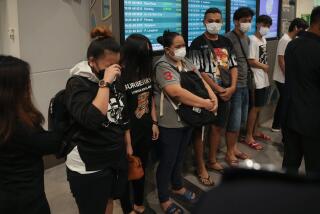Asian Crisis Puts New Spin on Thai Press
BANGKOK, Thailand — The Asian economic crisis has taken a devastating toll on Thailand’s lively press, resulting in the closure of a dozen newspapers and magazines and the layoffs of 2,000 workers, including hundreds of journalists.
Many of the remaining reporters have seen their salaries frozen and benefits cut. With advertising revenue down 60% industrywide and the price of newsprint soaring, newspapers have reduced the use of color printing and cut their number of pages by as much as half.
But out of the ashes, a more aggressive, sophisticated and responsible press appears to be emerging, with the active encouragement of the government. As Thakoon Boonfarn, executive editor of the daily Khao Sod (Fresh News), puts it: “There’s no issue we won’t try to smoke out now.”
Virtually every day, Thailand’s papers are delving into serious economic issues they long ignored. They are reporting on corruption and mismanagement. Late last year, they were instrumental in uncovering a scandal over the government’s purchase of medical supplies at inflated prices that led to the resignation of Health Minister Rakkiat Sukthana and two deputy ministers.
“Our young journalists have responded to the economic crisis by finding out they have to be more aware, more vigilant, better informed,” Thakoon said. “I’ve seen them in the newsroom reading textbooks on economics, trying to understand issues, and that wouldn’t have happened 18 months ago.”
Khao Sod has become a crusading voice, mainly on environmental and economic issues, and has been rewarded with a 3% circulation increase, to 350,000. It has been able to keep all 120 reporters on the payroll and showed a 20% rise in net profit last year through cost-cutting measures to increase efficiency, even though ad revenue fell 50%.
The coming of age of Thailand’s press is not an isolated event in Southeast Asia, where the economic crisis has raised the level of debate and the questioning of government policy. That in turn has led to increased demands for democratization, political reform and an independent role for the press.
No subject is off limits except the royal family--a far cry from 20 years ago, when newspapers here were little more than government mouthpieces. The Philippines, Cambodia and Indonesia also are reaping the benefits of a press unfettered by government controls. Even Vietnam, Singapore and Malaysia have taken timid steps toward more media freedom.
The emergence of Thailand’s press is being watched with particular attention by other Southeast Asian nations because it is happening with the active encouragement of Prime Minister Chuan Leekpai’s government, which realizes the importance of image and has tried to foster good relations with the press.
Under the 1997 constitution, the most democratic in the country’s history, Thailand is doing away with the Press Control Act of 1941 and other draconian anti-press laws and has passed a National Information Act, which promotes openness in government. It also helped set up the Southeast Asian Press Alliance to monitor abuses by and against the press, reversing a trend in which pressures for such safeguards traditionally came from outside the region.
Senior editors agree, however, that the Thai press does not yet have a clean bill of health. Too many well-known journalists still trade their influence for personal or financial gain, they say, and too many young reporters--whose average starting salary is only $300 a month--accept “white envelopes,” or tips, for favorable stories. In addition, the media failed to provide any warning of the impending economic crisis that first hit this country in the summer of 1997.
“The crisis didn’t just start two years ago as everyone believes,” said Pichai Chuensuksawadi, editor of the English-language Bangkok Post, with a circulation of 52,000, whose staff has been slashed to 840 from 1,760. “There were plenty of indications five, six years ago that things were seriously wrong: corruption, scandals, mismanagement, public-sector debt, a lack of transparency.
“Like everyone else, we in the press were caught up in the bubble, believing the good times were real and would go on and on. We never gave the warnings of what was happening. So did we do a good job? In that respect, no.”
But Pichai believes that the watchdog role of Thai newspapers--which are independently owned and often listed on the stock exchange--has improved significantly because of the crisis. As a result, he says, questions are being raised that long went unasked, and Thais increasingly have come to realize that “the press’ job is to serve the society, not the government.”
More to Read
Sign up for Essential California
The most important California stories and recommendations in your inbox every morning.
You may occasionally receive promotional content from the Los Angeles Times.










